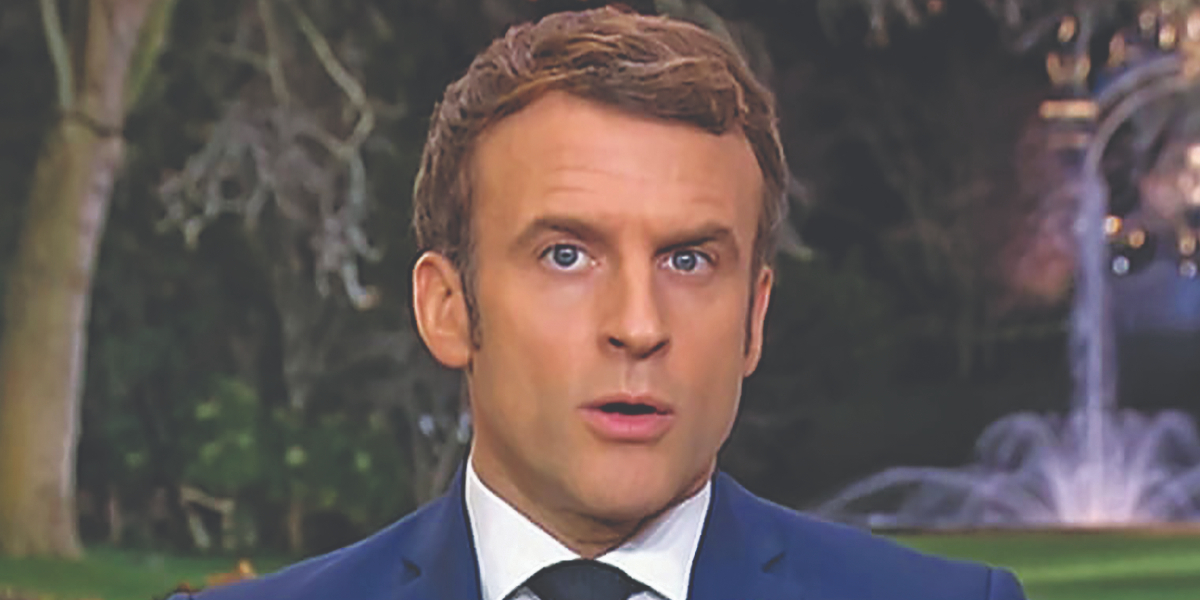PARIS –President Emmanuel Macron faced anger from opponents and chaos in parliament after warning French people not yet vaccinated against Covid-19 that they would be squeezed out of key aspects of life.
Macron’s warning prompted backlash from all his prospective opponents in the April election which he is favourite, but far from certain, to win. He also came under fire from challengers already in the race, accusing him of overstepping the line with his remarks.
The uproar even prompted a new delay to legislation aimed at tightening France’s Covid rules at a time when the country is facing record daily infection rates fuelled by the Omicron strain of the virus.
“As for the non-vaccinated, I really want to piss them off,” he told Le Parisien newspaper in an interview, using the French verb “emmerder”.
Derived from the word “merde” which means “shit”, the word is considered vulgar slang in France.
This would mean “limiting as much as possible their access to activities in social life,” he added.
“We have to tell (the unvaccinated)… you will no longer be able to go to the restaurant. You will no longer be able to go for a coffee, you will no longer be able to go to the theatre. You will no longer be able to go to the cinema,” the president said.
“If your freedom threatens others’ freedom, you become irresponsible. And irresponsible people are no longer citizens,” Macron added.
According to government figures, 91 per cent of French over-18s are fully vaccinated.
The rate surged over the summer after the introduction of a “health pass” which restricted many activities to those with proof of vaccination, a recent negative test or recovery from coronavirus infection. But that still leaves millions of people not covered as the Omicron wave breaks over the country.
In response, Macron’s government plans to make vaccination the only way to maintain access to much of public life with a so-called “vaccine pass” introduced from January 15.
Parliamentary debate over the tightening was already acrimonious, with the opposition forcing a delay in debate over the draft law.
Macron’s comments quickly derailed action in the chamber after it resumed, again suspending examination of the bill and jeopardising the government’s timetable for it to come into force, although ministers insist that is still their aim.
“It’s not up to the president of the Republic to pick out good and bad French people,” Republicans candidate Valerie Pecresse, seen by many as Macron’s most credible challenger, told broadcaster CNews. She called for a government “that unites people and calms things down”.
Macron “has never felt himself to be president of all French people,” far-right presidential candidate Marine Le Pen charged. Far-left firebrand Jean-Luc Melenchon called the vaccine pass plan “collective punishment against individual freedom”.
Other critics mocked the president’s claim last month that “I’ve learned to have a lot more respect for everyone”, after he previously earned a reputation for sometimes tactless comments.
A graduate of France’s most elite schools and a former investment banker with little experience of politics before sweeping to power in 2017, Macron was accused of talking down to voters in the early years of his presidency and faced a months-long backlash from “yellow vest” protesters.
His remarks were “a brutal form of words… that could run up against the idea people have of how a president is supposed to behave,” OpinionWay pollster Bruno Jeanbart told AFP.
“If it’s a strategy, it’s quite a troubling one”.
But Macron’s former prime minister Edouard Philippe told France 2 television that he backed his old boss.
“The president doesn’t want fully vaccinated people to be subject to restrictions because eight to 10 per cent of the population refuses,” he said.
“I think there’s a large majority of people who agree”.
According to earlier reports France takes over the rotating presidency of the European Union on January 1, affording President Emmanuel Macron the chance to pose as the EU’s de facto leader.
With Merkel now retired and the timely gift of the rotating presidency of the EU Council from January 1, Macron has announced an ambitious agenda for the 27-member bloc that could also serve his domestic campaign for re-election. “The year 2022 must be a turning point for Europe,” he said in a New Year’s Eve national address that hailed the EU’s role during the Covid-19 crisis.
Banning of extreme-right group
France banned an extreme-right youth group known as the “Zouaves Paris” blamed for attacks on anti-racism activists at a raucous rally last month by far-right presidential candidate Eric Zemmour.
“The group ‘Zouaves Paris’ was banned at a cabinet meeting, in line with the instructions of the President” Emmanuel Macron, Interior Minister Gerald Darmanin wrote on Twitter, saying the group had incited “hatred and violence”.
The decree prohibiting the group, founded in 2017 and believed to have only around 20 hardcore members, said it “propagated an openly racist discourse” that included “symbols of Nazi ideology” and “white superiority”.
Members were accused of assaulting activists from SOS Racisme at the December 5 rally by Zemmour shortly after the controversial pundit announced his candidacy for the 2022 presidential elections.
Its leader Marc de Cacqueray-Valmenier, 23, was detained and charged with assault. The group takes its name from elite units of French troops who fought in Africa in the 19th century.
Zemmour is accused by opponents of being a racist, an allegation he denies. He has repeatedly however criticised Islam and immigration, which he says are harming French identity.
The rally was marked by clashes with anti-racism activists, and Zemmour himself was at one point put in a headlock and suffered an injury to his wrist.
Zemmour’s campaign enjoyed a surge in popularity ahead of the declaration of his candidacy, but it appears to have slackened in recent weeks, although most polls still predict he will win around 15 percent in the first round.
He is currently facing a struggle to muster the 500 signatures needed from French mayors to formally register his candidacy.

















